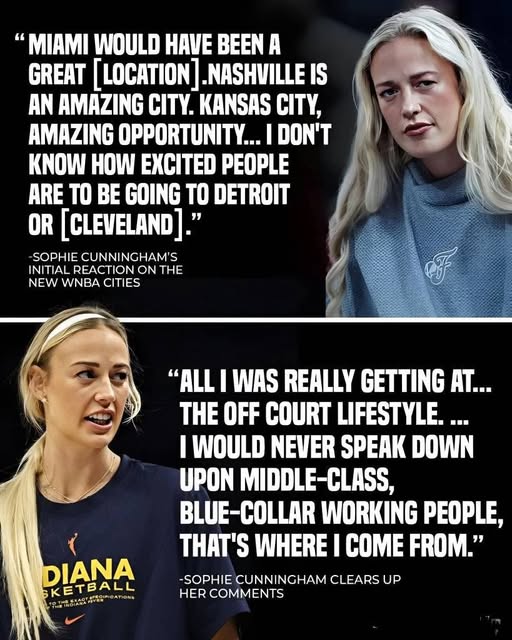Sophie Cunningham, the fiery guard for the Indiana Fever, recently found herself at the center of a swirling controversy following her candid remarks about the WNBA’s latest expansion to Cleveland, Detroit, and Philadelphia. What began as an off-the-cuff take quickly grew into a national conversation, with civic leaders, sports stars, and fans weighing in—and Cunningham herself stepping forward to clarify her stance.
On June 30, the WNBA officially announced its plan to expand by awarding franchises to Cleveland (2028), Detroit (2029), and Philadelphia (2030), raising the league’s footprint to 18 teams, following the introduction of Toronto and Portland in 2026 . The expansions were hailed as a major milestone, but also sparked questions about pace and market selection. Amid this backdrop, Cunningham was approached by reporters on July 1 for her thoughts. Her reply was refreshingly unfiltered.
“You want to listen to your players, too,” she said. “Where do they want to play? Where are they gonna get excited to play and draw fans?… I do think that Miami would have been a great [location]… Nashville is an amazing city. Kansas City, amazing opportunity.” But she added, “I don’t know how excited people are to be going to Detroit or [Cleveland]” . The ambiguity in her tone—call it honest or contentious—set off a tidal wave.
Within hours, Cleveland and Detroit signaled their displeasure. Cleveland’s official X account cheekily shared a clip of Cunningham’s teammate Caitlin Clark praising the city during the 2024 NCAA Final Four, adding, “Sophie, your teammate doesn’t seem to think Cleveland is too bad! … any player who comes here will feel that legendary passion Cleveland sports fans show our teams!” (. Detroit fired back with an even sharper note, boasting that the former Shock franchise was “top five in attendance for five straight seasons, No. 1 in attendance for three straight seasons” and that their 2003 WNBA Finals Game 3 drew a record 22,076 fans, calling Detroit “a sports town” and predicting similar excitement when the WNBA returns .
The responses didn’t just come from official city accounts. Cleveland Cavaliers guard Donovan Mitchell chimed in on X, calling Cleveland “an unbelievable sports town, with great people, great restaurants,” echoing the sentiment. Tristan Thompson also weighed in: “Still surprises me to see people say stuff like this” . Legendary WNBA player Lisa Leslie, meanwhile, reportedly expressed her disapproval via Instagram, reinforcing the idea that Cunningham’s view struck a nerve within the league .
For Cunningham, what may have started as a sincere rather than malicious take rapidly spiraled into a narrative painting her as dismissive of historically rich markets. Fans and media pounced, and her comments dominated sports coverage throughout the week . In the span of days, she found herself revisiting reporters—first ahead of Indiana’s next game and later formally speaking to clarify her comments.
On July 3, Cunningham returned to the microphones with a toned-down, thoughtful clarification. “First of all, I know the history behind the WNBA. I know both of those cities had teams before, and they got us where we’re at, so I’m thankful for that,” she began . She reiterated her focus had been on off‑court lifestyle—things like Broadway shows, beaches, entertainment—where she believed some newer markets might offer a different allure: “All I was really getting at is Broadway, the off-court lifestyle… Miami is intriguing.” She continued: “That’s all I was getting at. I would never speak down upon middle-class, blue-collar working people—that’s where I come from. I’m from Missouri, I get I’m in Indiana.” According to Cunningham, people “totally misread the situation” With intentionality, she emphasized her own blue‑collar roots and clarified that her perspective had been rooted in personal experience, not a slight to Detroit or Cleveland.
Beyond Cunningham’s narrative, the incident exposed broader themes in women’s sports: the precarious balance between athletic expansion and cultural inclusion, the resolutions required when populist platforms collide with regional pride, and the lasting power of words in the age of social media. Critics pointed out that referencing flashy or glamorous cities came off tone-deaf to fans in traditional but serious sports towns—especially towns with strong basketball legacies.
Cleveland once hosted the Rockers (1997–2003), while Detroit was home to the Shock (1998–2009), a team that posted three championships and regularly led the league in attendance . These teams were foundational pillars in WNBA history, and their legacies continue to resonate. Cunningham’s perceived dismissal of these cities, however unintentionally, prompted a community response rooted in pride and historical validation.
WNBA legend Lisa Leslie reportedly entered the discussion on social media, signaling that expectations for professional decorum still run high within the league. And prominent voices such as Donovan Mitchell and Tristan Thompson highlighted how connected the current sports ecosystem is—even NBA players seeing value in defending WNBA franchises speaks volumes about cross-sport solidarity.
Media coverage emphasized how expansion should be driven by factors like locale, entertainment infrastructure, player preference, and long-term viability. The Commercial Commissioner’s Cup win by Indiana the same week only amplified the attention Cunninghan’s comments received, demonstrating how intertwined performance, media scrutiny, and cultural resonance are in sports today .
Some analysts, like CBS Sports, wrote that had Cunningham framed her point differently—focusing on athlete-driven decision-making or the value of non-NBA markets—the reaction might have been more sparing . Indeed, the league may stand to benefit from expansion into cities where women’s clubs can become the primary team attraction—Las Vegas being a prime example. But Cunningham’s tone and selective naming made her appear dismissive of entire communities, regardless of her intent.
Cunningham’s clarification addressed this head-on: she stressed respect. “I’m thankful for what they’ve done for the history of our sport,” she stated, explicitly naming Cleveland and Detroit In asserting that her comments were personal opinion—not league-wide policy—she extended an olive branch. She acknowledged the misunderstanding and remained firm that she would never denigrate hardworking, blue-collar communities, of which she identifies as one .
The episode underscores a truth: expansion is never just about geography. It’s intertwined with cultural identity and regional memory. For league leaders, the proliferation of teams must balance market size, fan appetite, ownership infrastructure, and—crucially—perception and sentiment.
Philadelphia, for instance, drew positivity across the board. Natasha Cloud, a Philadelphia local and veteran of the WNBA, welcomed the city’s inclusion, calling it a “dream come true” for local players and fans. Her enthusiasm contrasted sharply with Cunningham’s hesitancy tied to Cleveland and Detroit, and emphasized how sentiment drives success .
Still, growth involves risk—and sometimes discomfort. Cunningham admitted as much when she referenced the league’s pace. “At the end of the day, you also want to make sure that you’re not expanding our league too fast,” she said . This reflects tension between the excitement of rapid growth and the reality of infrastructure and fandom readiness.
In the days since her comments and clarification, Cunningham has avoided any formal apologies but has leaned into transparency. By acknowledging her misstep and offering context about her intent, she’s attempted to reset the narrative. She emphasized staying “right here in the middle”—living her truth while acknowledging she might have missed the mark .
Fans and experts watching this unfold have expressed mixed sentiments. Many appreciated Cunningham’s honesty, commending her for speaking candidly about player preferences and off-court life. Others criticized what they called a tone-deaf approach to storied cities. On Reddit, sentiment was divided: some users felt she opened an important dialogue, while others questioned the choice of words and the timing .
As the dust settles, the WNBA moves forward, confident that Cleveland, Detroit, and Philadelphia will soon embrace women’s basketball anew. Whether Cunningham’s comments leave a lasting mark is uncertain—but they provide a snapshot into what growth looks like in today’s media landscape: complex, fraught, rapid, and deeply human.
Sophie Cunningham’s back-and-forth has done more than stir controversy—it’s acted as a mirror. It reminds us that expansion isn’t just economic; it’s cultural. Cities with legacy matter. Players with voices shape narratives. And the game isn’t just forged in stadiums but in airwaves, tweets, and lived experience.
Ultimately, Cunningham’s decision to speak again and clear the air speaks to a greater lesson about accountability and communication. She didn’t dismiss the uproar or deflect blame. Instead, she clarified, acknowledged, and contextualized. She said she was misunderstood, yet stood by her original questions about league strategy and player experience. In doing so, she opened up a valuable dialogue on what expansion means not just for markets, but for identity, legacy, and belonging.
In the coming years, as Cleveland embraces its Rockers heritage, Detroit revives Shock passion, and Philadelphia welcomes its new addition, the league will inevitably reflect on this moment. Will future players approach media questions more cautiously? Will expansion debates hinge less on glamour and more on respect? Perhaps—but if transparency is the cost of progress, Cunningham appears willing to pay it.
In the end, her comments—and her willingness to engage—may prove to be well-timed reflections on growth, community, and the delicate art of representing voices in a league that’s expanding faster than many ever expected.



